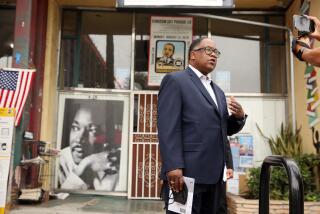Boesky Asks Judge to End Prison Term
- Share via
NEW YORK — Ivan F. Boesky has asked a federal judge to end his three-year prison term but prosecutors Wednesday refused to take a stand on releasing the former speculator at the center of Wall Street’s insider trading scandals.
Boesky, who has already served one year in prison, claimed that his help led to a record plea bargain deal by Drexel Burnham Lambert Inc. and the subsequent indictment of its “junk bond” financier Michael Milken and others on racketeering and securities fraud charges.
Boesky’s lawyers Tuesday asked U.S. District Judge Morris E. Lasker to reduce his sentence to time already served, which would allow his speedy release.
“The true fruits of Ivan Boesky’s unsurpassed cooperation with the government are now--for the first time--dramatically, fully and publicly known,” the court papers said.
The court documents claimed that Boesky was “to a significant extent a follower in a larger criminal conspiracy organized and operated” by Drexel and its high-yield bond department headed by Milken.
‘No Position’
The 98-count indictment of Milken, handed down March 29, alleged that the Drexel bond trader illegally schemed with Boesky to defraud clients and the investing public by manipulating stock prices and skirting federal securities laws during attempted takeovers.
In a letter to Lasker, who sentenced Boesky in December, 1987, the U.S. Attorney’s Office in Manhattan said “the government takes no position” on Boesky’s move, but acknowledged his cooperation in the almost three-year probe into Wall Street corruption.
Assistant U.S. Atty. Jess Fardella, writing on behalf of U.S. Atty. Benito Romano, noted that “the fruits of his cooperation are now more vividly apparent to the public.”
Fardella described the Milken indictment and the $650-million tentative settlement of criminal charges Drexel reached with the government as “the centerpiece of Boesky’s cooperation.”
The letter continued: “Boesky’s disclosures were the essential catalyst for all that has been and remains to be revealed in those cases. Other investigations arising directly from Boesky’s disclosures have also matured since Boesky’s sentencing.”
But it added that “the government nevertheless articulated the value of that cooperation in unqualified terms when Boesky was sentenced.”
Boesky attorney Leon Silverman said: “I will have no comment while it’s under consideration by the court.”
Once one of the leading speculators on the stock of potential takeover targets, Boesky pleaded guilty to one felony count as part of his plea bargain. Boesky, 52, also agreed to pay a then-record $100 million to settle civil insider trading charges brought by the Securities and Exchange Commission.
On April 15, 1988, Boesky filed papers seeking a sentence reduction but asked Lasker to defer action. Attorneys again deferred the request in October and said last week that they planned to seek his release following Milken’s long-awaited indictment.
The lawyers on Tuesday said “public ‘blood lust’ ” at the time of sentencing could not be countered.
Working as an Orderly
“As the court recognized at sentencing, it was impossible for the public or the press to understand the incalculable value of Mr. Boesky’s cooperation because the secrecy of the grand jury process precluded any public recitation of the value of the information that he had provided to the government,” they said.
Boesky was eligible for parole March 21, two days before his one-year anniversary inside the minimum security prison camp in Lompoc, Calif., where the one-time corporate titan is working as an orderly. Boesky has supplied information used in more than a dozen cases in the United States and Britain. In exchange, Boesky was allowed to plead guilty to one count of conspiracy to lie to the SEC. His earliest non-parole release date is April 4, 1990.
At the time of sentencing, prosecutors said Boesky’s three-year term “was an appropriate sentence in light of all the competing factors.”
They also said that while Boesky provided a “window on the rampant criminal conduct” in the securities industry he also “engaged in serious and widespread criminal conduct.”
More to Read
Inside the business of entertainment
The Wide Shot brings you news, analysis and insights on everything from streaming wars to production — and what it all means for the future.
You may occasionally receive promotional content from the Los Angeles Times.










